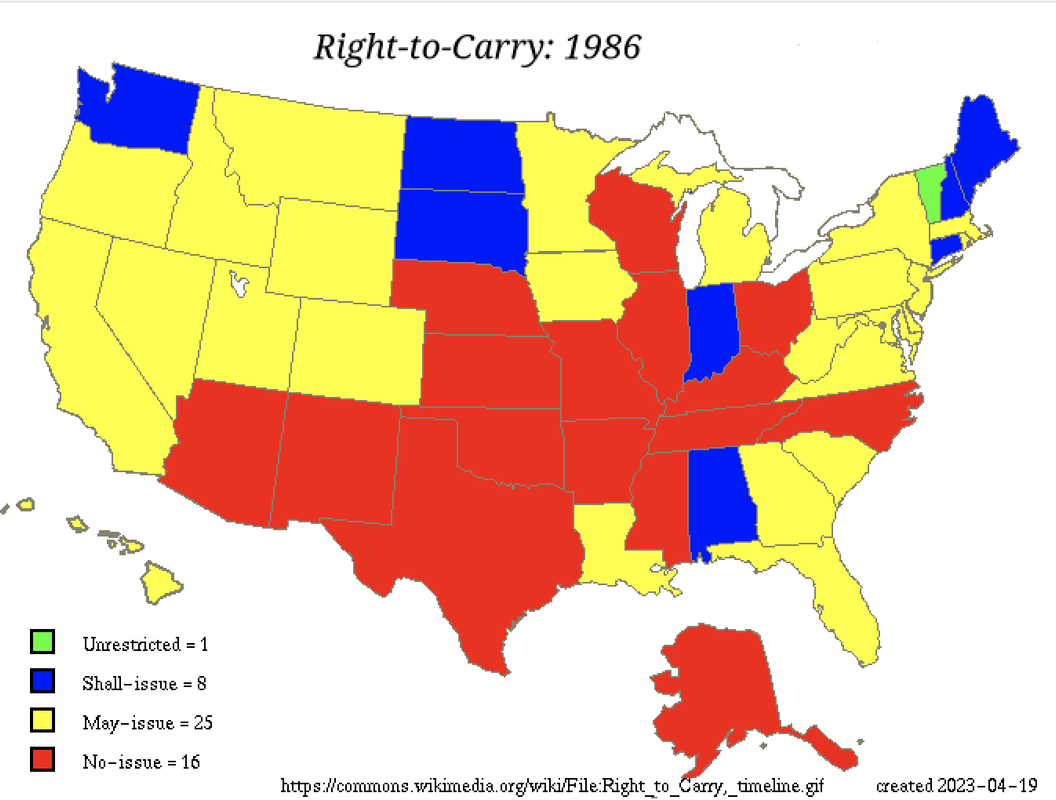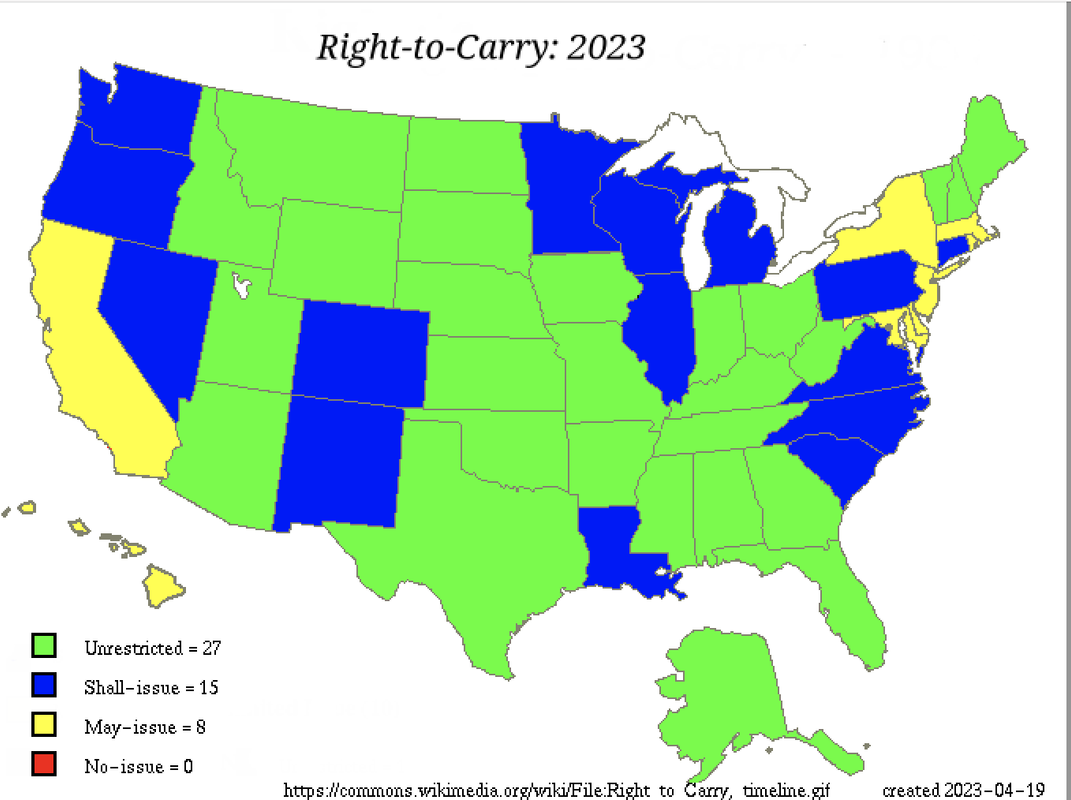先看一下维基百科上1986和2023年美国right-to-carry州的比较


86年包括得克萨斯在内的16个州禁止持枪,只有一个州没有限制。 到了2023年, 无限制的州增长到27个,一个禁止持枪的都没有。
在这些年发生了啥?
为了解释这个变化就必须了解美国警察和民众的关系发生了什么变化。 而这个变化的开端就是1975年在华盛顿发生的一起恶劣的入室抢劫强奸案。关于此案维基有详细描述。 这里把案件过程抄过来方便阅读
Warren, Taliaferro, and Douglas
In the early morning hours of Sunday, March 16, 1975, Carolyn Warren and Joan Taliaferro, who shared a room on the third floor of their rooming house at 1112 Lamont Street Northwest in the District of Columbia, and Miriam Douglas, who shared a room on the second floor with her four-year-old daughter, were asleep. The women were awakened by the sound of the back door being broken down by two men later identified as Marvin Kent and James Morse. The men entered Douglas' second floor room, where Kent forced Douglas to perform oral sex on him and Morse raped her.
Warren and Taliaferro heard Douglas' screams from the floor below. Warren called 9-1-1 and told the dispatcher that the house was being burglarized, and requested immediate assistance. The department employee told her to remain quiet and assured her that police assistance would be dispatched promptly.
Warren's call was received at Metropolitan Police Department Headquarters at 6:23 am, and was recorded as a burglary-in-progress. At 6:26, a call was dispatched to officers on the street as a "Code 2" assignment, although calls of a crime in progress should be given priority and designated as "Code 1." Four police cruisers responded to the broadcast; three to the Lamont Street address and one to another address to investigate a possible suspect.
Meanwhile, Warren and Taliaferro crawled from their window onto an adjoining roof and waited for the police to arrive. While there, they observed one policeman drive through the alley behind their house and proceed to the front of the residence without stopping, leaning out the window, or getting out of the car to check the back entrance of the house. A second officer apparently knocked on the door in front of the residence, but left when he received no answer. The three officers departed the scene at 6:33 am, five minutes after they arrived.
Warren and Taliaferro crawled back inside their room. They again heard Douglas' continuing screams; again called the police; told the officer that the intruders had entered the home, and requested immediate assistance. Once again, a police officer assured them that help was on the way. This second call was received at 6:42 am and recorded merely as "investigate the trouble;" it was never dispatched to any police officers.
Believing the police might be in the house, Warren and Taliaferro called down to Douglas, thereby alerting Kent to their presence. At knifepoint, Kent and Morse then forced all three women to accompany them to Kent's apartment. For the next fourteen hours the captive women were raped, robbed, beaten, forced to commit sexual acts upon one another, and made to submit to the sexual demands of Kent and Morse.
Warren, Taliaferro, and Douglas brought the following claims of negligence against the District of Columbia and the Metropolitan Police Department: (1) the dispatcher's failure to forward the 6:23 am call with the proper degree of urgency; (2) the responding officers' failure to follow standard police investigative procedures, specifically their failure to check the rear entrance and position themselves properly near the doors and windows to ascertain whether there was any activity inside; and (3) the dispatcher's failure to dispatch the 6:42 am call.
https://en.wikipedia.org/wiki/Warren_v. ... f_Columbia
受害者对警察不作为的起诉被下级法庭以警察对公民的保护仅限于抽象而不具体的个人为由dismiss该案。上诉到DC上诉法庭维持原判。
In a 4–3 decision, the District of Columbia Court of Appeals affirmed the trial courts' dismissal of the complaints against the District of Columbia and individual members of the Metropolitan Police Department based on the public duty doctrine ruling that "the duty to provide public services is owed to the public at large, and, absent a special relationship between the police and an individual, no specific legal duty exists".
这个判决当然引起轩然大波,原来警察的工作不是保护个体公民的生命财产不受侵犯,出警不是责任而是善心。 这个自然导致了美国普通民众的恐慌和开始支持个人持枪。从此以后枪支泛滥就一发不可收拾。
到了2005年,另外一起恶性杀人案又因为警察不强制禁制令导致3名儿童遇难被告,这次一直告到最高法院。案件细节参见Town of Castle Rock v. Gonzales。 此案的重要性在于最高法院从宪法层面定义了警察不能因为不作为没有错,虽然理由非常诡异。
The Court's majority opinion by Justice Antonin Scalia held that enforcement of the restraining order was not mandatory under Colorado law; were a mandate for enforcement to exist, it would not create an individual right to enforcement that could be considered a protected entitlement under the precedent of Board of Regents of State Colleges v. Roth; and even if there were a protected individual entitlement to enforcement of a restraining order, such entitlement would have no monetary value and hence would not count as property for the Due Process Clause.
到此大家看到了,在美国警察的责任只是在犯罪之后尽力替你将罪犯绳之以法,仅此而已,犯罪过程之中报警求救还是自求多福吧。
这基本就是美国这些年枪控越来越弱的主要原因。而不是右派网友吹嘘的推翻政府。
所以,想解决枪支泛滥问题首先是要重新界定警察的职责,不然的话你很难说服大部分美国人彻底放弃枪支。

